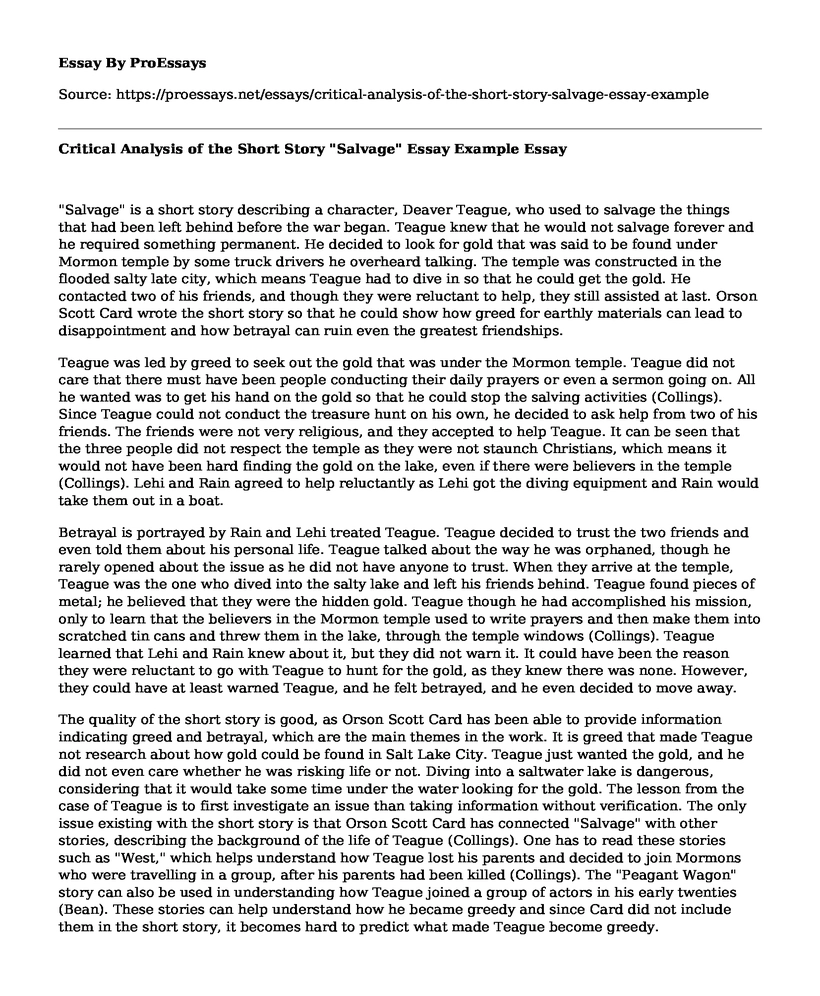"Salvage" is a short story describing a character, Deaver Teague, who used to salvage the things that had been left behind before the war began. Teague knew that he would not salvage forever and he required something permanent. He decided to look for gold that was said to be found under Mormon temple by some truck drivers he overheard talking. The temple was constructed in the flooded salty late city, which means Teague had to dive in so that he could get the gold. He contacted two of his friends, and though they were reluctant to help, they still assisted at last. Orson Scott Card wrote the short story so that he could show how greed for earthly materials can lead to disappointment and how betrayal can ruin even the greatest friendships.
Teague was led by greed to seek out the gold that was under the Mormon temple. Teague did not care that there must have been people conducting their daily prayers or even a sermon going on. All he wanted was to get his hand on the gold so that he could stop the salving activities (Collings). Since Teague could not conduct the treasure hunt on his own, he decided to ask help from two of his friends. The friends were not very religious, and they accepted to help Teague. It can be seen that the three people did not respect the temple as they were not staunch Christians, which means it would not have been hard finding the gold on the lake, even if there were believers in the temple (Collings). Lehi and Rain agreed to help reluctantly as Lehi got the diving equipment and Rain would take them out in a boat.
Betrayal is portrayed by Rain and Lehi treated Teague. Teague decided to trust the two friends and even told them about his personal life. Teague talked about the way he was orphaned, though he rarely opened about the issue as he did not have anyone to trust. When they arrive at the temple, Teague was the one who dived into the salty lake and left his friends behind. Teague found pieces of metal; he believed that they were the hidden gold. Teague though he had accomplished his mission, only to learn that the believers in the Mormon temple used to write prayers and then make them into scratched tin cans and threw them in the lake, through the temple windows (Collings). Teague learned that Lehi and Rain knew about it, but they did not warn it. It could have been the reason they were reluctant to go with Teague to hunt for the gold, as they knew there was none. However, they could have at least warned Teague, and he felt betrayed, and he even decided to move away.
The quality of the short story is good, as Orson Scott Card has been able to provide information indicating greed and betrayal, which are the main themes in the work. It is greed that made Teague not research about how gold could be found in Salt Lake City. Teague just wanted the gold, and he did not even care whether he was risking life or not. Diving into a saltwater lake is dangerous, considering that it would take some time under the water looking for the gold. The lesson from the case of Teague is to first investigate an issue than taking information without verification. The only issue existing with the short story is that Orson Scott Card has connected "Salvage" with other stories, describing the background of the life of Teague (Collings). One has to read these stories such as "West," which helps understand how Teague lost his parents and decided to join Mormons who were travelling in a group, after his parents had been killed (Collings). The "Peagant Wagon" story can also be used in understanding how Teague joined a group of actors in his early twenties (Bean). These stories can help understand how he became greedy and since Card did not include them in the short story, it becomes hard to predict what made Teague become greedy.
Conclusion
To conclude, "Salvage" can be used as a lesson in real life. It is a warning to the greedy people to learn that they cannot trust everyone. Dishonesty is a vice which destrpys relationships as seen with Teague with his friends.
Works Cited
Collings, Michael R. In the Image of God: Theme, Characterization, and Landscape in the Fiction of Orson Scott Card. No. 42. Greenwood Publishing Group, 1990.
Bean, Kent Richard. Policing the Borders of Identity at The Mormon Miracle Pageant. Diss. Bowling Green State University, 2005.
Cite this page
Critical Analysis of the Short Story "Salvage" Essay Example. (2022, Nov 06). Retrieved from https://proessays.net/essays/critical-analysis-of-the-short-story-salvage-essay-example
If you are the original author of this essay and no longer wish to have it published on the ProEssays website, please click below to request its removal:
- Establishment of Tone and Atmosphere in "A Rose for Emily" by William Faulkner
- Summary of the Actions of Hamlet
- The Astronauts by Robert Hayden - Poetry Analysis Essay
- Literary Analysis Essay on "Girl", "Bullet in the Brain" and "A Clean, Well-Lighted Place"
- Literary Analysis Essay on "Am I Really a Leader?" by Sally Helgesen
- Book Analysis Essay on Strangers of the Land by Arlie Hochschild
- Article Analysis Essay on The Tale of Genji: A Fascinating Insight into Poetry's Greats







